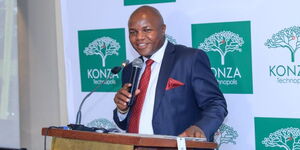On Friday, February 5, Kenyans online demanded that the national government should step in and clear their debts with the Higher Education Loans Board (HELB) and expunge their names with Credit Reference Bureaus (CRB) for them to consider voting for the Building Bridges Initiative (BBI) report.
The discussion stemmed from the recent reports linking a Ksh2 million car grants for MCAs. The timing of the grant has led many to allege that the move is meant to appease the county legislators vote in favor of the BBI report.
"In the car grant spirit, our CRB and HELB loans must be cleared before we pass this thing," one social media user said.
"If MCAs will be granted Ksh 2 million to pass the BBI, graduates should also be granted loan clearance for CRB and HELB. We need a robust conversation because Kenya doesn't belong to politicians alone," he added.
Thousands of Kenyans joined in the conversation across various social media platforms, with the level of unemployment among Kenya's youth emerging as a key theme.
A spot check by Kenyans.co.ke revealed that the cost of obtaining the HELB certificate is Ksh 1,000, a CRB certificate will set you back Ksh 2,200 while a certificate of good conduct goes for Ksh 1,050.
Kenyans have in the past protested the unnecessary fees which they term as inconsiderate hurdles one has to get over when trying to secure a job.
This forced the loan board to make a few adjustments with HELB CEO Charles Ringera saying the board will stop charging Ksh1,000 for the young people looking for jobs, adding that the fee has been perceived as punitive for those who did not benefit from the student loans.
HELB added that complaints had been raised on various platforms regarding the same with some saying that unemployment and under-employment challenges could not allow them to raise the money.
In December 2019, a woman in Uriri Sub-county in Migori County allegedly committed suicide because she was unable to repay a Ksh 9,000 microfinance loan.
In a similar incident, a 25 years old man committed suicide in July 2019, after he was allegedly unable to repay a Ksh 3,000 loan that he had borrowed through a mobile phone app.
Census data shows that 5,341,182 or 38.9 percent of the 13,777,600 young Kenyans are jobless.
The country has 18.9 million people not involved in any economic activity, out of which 16.1 million are full-time students.
22.9 million or 48.2 percent of the population are below 17 years, pointing to a wave of millions of job seekers joining the market.
In December 2020, The Higher Education Loans Board (HELB) reduced the average loan offered to university students from Ksh 45,000 to Ksh 37,000.
HELB CEO Charles Ringera attributed the Ksh8,000 reduction to the effects of the Covid-19 pandemic.
The data he presented in parliament showed that 38,314 graduates defaulted on their loan repayment in the 10 months to October 2020.
In March 2020, Proposed amendments to the Employment Act of 2007, excited Kenyans as it would see graduates provide clearance certificates only after receiving a formal job offer from a prospective employer.
The Bill, sponsored by Youth Representative, Gideon Keter aims to offer relief for job seekers unable to meet the costs of these documents and consequently miss out on job opportunities.
This is not the first time the HELB has found itself in the firing line of Kenya's youth.
In February 2020, the board posted a notice announcing that it would publish names and pictures of over 85,000 loan defaulters.
This did not go down well with Kenyans who once again highlighted the plight of the unemployed, a situation that was made worse by the Covid-19 pandemic.
A total of 604 firms in Kenya sent workers home due to the coronavirus fallout, the Federation of Kenya Employers (FKE) revealed in September 2020.
KNBS estimated that around 1.7 million people have been made redundant due to the outbreak during this time, a figure FKE termed as conservative.












